I recently tuned in to a TikTok live with Rev. Dr. Sarah TevisTownes, and it was such a refreshing experience! She was casually chatting with another TikToker when the topic of self-care came up. One of her insights stuck with me: boundary training is essential for clergy. She pointed out that the first boundary many clergy struggle with is self-care. Her words were a powerful reminder of how critical it is for clergy to prioritize their well-being while serving others.
As clergy, we’re used to pouring from our cup—teaching, preaching, pastoring, and occasionally being volunteered to chair yet another committee meeting. But let’s be honest: sometimes, our cups are so empty that we’re just waving around a spiritual coffee mug, hoping for a refill! The truth is, self-care isn’t a luxury for ministers—it’s a necessity. Even Jesus took time to pray alone, and the last time I checked, none of us were outperforming the Messiah.
The Manual on Ministry reminds us that self-care and life balance are critical elements of faithful and effective ministry. It’s not just about taking bubble baths (though, if that’s your thing, go for it). It’s about honoring our humanity because we cannot pour into others while running on fumes. Without rest and renewal, even the holiest among us might mistake the parish copier for the burning bush.
Here are three lighthearted yet serious reasons clergy need self-care—and yes, the Manual on Ministry backs me up on this:
1. Your Congregation Deserves More Than a Sleep-Deprived Prophet.
The manual calls for ministers to maintain “a basic understanding of mental health and wellness.” If your sermons start to sound like dramatic readings from Leviticus, complete with yawns and side notes about how tired you are, it’s time to step back. You’re called to inspire, not to prove you can survive on three hours of sleep and a pot of coffee.
2. Self-Care is Biblical.
The Manual on Ministry aligns with Scripture in its call for ministers to “practice self-care and life balance.” Even God took a day off after creating the world. If God can rest, you can too—unless you’re secretly crafting universes on your day off (and if so, please seek help).
3. Burnout is Not a Spiritual Gift.
The manual states that clergy should engage in “supervision as appropriate” and nurture their spiritual and pastoral care. Translation? You can’t shepherd your flock effectively if you secretly fantasize about leaving them in the wilderness with Moses. Burnout is not noble; it’s preventable.
So, dear clergy, let this be your permission slip: take care of yourself! Schedule a retreat, spend time with family, walk, or even pick up a hobby (gardening counts—even if you’re watering the plants in your office). Remember, rest isn’t selfish—it’s sacred. And who knows? Maybe a little self-care will lead to a sermon that doesn’t involve accidentally quoting the wrong gospel.
The Manual on Ministry reminds us that “providing hope and healing to a hurting world” begins with tending to our needs. So go ahead—be a little selfish for the sake of the Kingdom. After all, you’re worth it, and so is your ministry.

